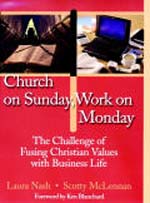 Business and religion have always made an ugly couple. From the Busy Folks’ Bible Class at George Babbitt’s local church to J. F. Power’s Billy Cosgrove, we imagine that businesspeople inevitably get religion all wrong. Somehow, they pollute it with eagerness for success, cheery optimism, and a propensity for dishonesty when the going gets tough. Their religious goal, if they have one, is to be in the bishop’s foursome at next year’s diocesan golf outing. It’s no wonder that churches generally want (except for fund-raising, of course) to keep their distance.
Business and religion have always made an ugly couple. From the Busy Folks’ Bible Class at George Babbitt’s local church to J. F. Power’s Billy Cosgrove, we imagine that businesspeople inevitably get religion all wrong. Somehow, they pollute it with eagerness for success, cheery optimism, and a propensity for dishonesty when the going gets tough. Their religious goal, if they have one, is to be in the bishop’s foursome at next year’s diocesan golf outing. It’s no wonder that churches generally want (except for fund-raising, of course) to keep their distance.
Church on Sunday, Work on Monday tries to explain why churches have done such a poor job of relating to churchgoers as working people. Laura Nash, a Harvard Business School researcher, and Scotty McLennan, dean for religious life at Stanford (and yes, once the prototype for Doonesbury’s Reverend Scott Sloan), are a surprisingly good combination to tackle this lacuna. Unlike most business books, their work is well written and succinct—great reading for both people inside the church as ministers and working people who want a basic introduction to the issues.
Why the great divorce between faith and work? Most business people, Church on Sunday says, are basically optimistic: in theology and even in practice, they tend to like change, building, competition, and fixing problems. Meanwhile, churches of almost every stripe are built to keep change at bay, even when it’s the only way forward. This clash between the go-getters and the keepers of the flame emerges inside business too, but there the torch passes along to a new generation sooner or later—or the business goes under. The torch-passing doesn’t often happen in churches.
The businesspeople interviewed in Church on Sunday don’t pull any punches pointing out how little interest their churches take in what they do for a living. When they hear preaching about business—if they hear it at all—it’s to expose commerce as a nasty symptom and perhaps a root cause of materialistic malaise. The result: people who feel their church doesn’t know very much about, and mostly doesn’t respect, what they’re doing most of their waking hours.
The solution, of course, may not lie inside the churches at all. A growing industry of nondenominational but vaguely spiritual books, workshops, and groups is already talking about fairness, leadership, and vocational choice. Much of this sort of talk ends up as compromised and Babbitt-like as you might imagine. But the best of it does give people some sort of structure for “principle-centered living,” as the Mormon management thinker Stephen Covey calls it. To be sure, his turgid but endlessly best-selling The 7 Habits of Highly Successful People is more a gospel of personal empowerment than the whole gospel. But Covey’s success comes from acknowledging that most people work in a complex, nondenominational world—and that the average business person does want, in some way, both to do good and to do well. If churches want to reach businesspeople, they could do worse than start from those assumptions.
Thomas Baker is a media consultant in Princeton Junction, New Jersey. This review appeared in Commonweal (June 2002) and is excerpted here by permission.